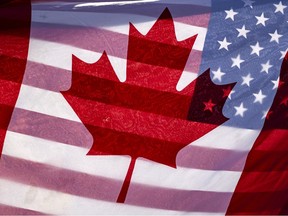
Article content
Windsor’s manufacturing sector is facing tariff turmoil, and mental health support must keep up.
Unease is settling across Canada. You can hear it in tense conversations at the grocery store, and you can feel it in the pit of your stomach when another news alert flashes across your phone.
We’ve all been watching an on-again, off-again trade war unfold, feeling powerless as the economy wobbles under the weight of political unpredictability.
Advertisement 2
Article content
With every hit to our collective sense of stability, stress tightens its grip. This type of uncertainty doesn’t just shake markets. It shakes people. It keeps them awake at night, fuels anxiety, and too often, it takes a quiet, devastating toll on mental health.
It’s a toll that Windsor feels acutely.
As a border city built on manufacturing, Windsor is the nation’s proverbial bellwether, signaling trouble long before the rest of Canada feels the impact. The 2008 financial collapse hammered Windsor’s auto industry, shutting down assembly lines and wiping out thousands of jobs.
Then came the COVID-19 pandemic which took far too many lives and devastated small businesses that rely on cross-border traffic. Now, tariffs and trade instability threaten to wreak similar havoc all over again.
And yet, while Windsor may be on the front line, the data make it clear: this crisis is nationwide.
Advertisement 3
Article content
Mental health issues are surging across the country. New research from Mental Health Research Canada (MHRC) shows nearly half of Canadians are feeling increased stress, driven by political uncertainty and rising costs. Forty-two per cent say financial stress is impacting their well-being — up from 35 per cent in December. More than a third worry they won’t be able to pay their bills.
Anxiety is rapidly spreading, with MHRC showing U.S.-Canada tensions now ranking as the second-highest source of stress among Canadians, just behind the cost of living.
Yet, despite this clear link between economic instability and mental health, too many Canadians struggle alone. Discourse about economic recovery through tough times rarely touches on the psychological impact of financial stressors on Canadians. Meanwhile, therapy remains out of reach for many — held back by cost, stigma, or simply not knowing where to turn.
Advertisement 4
Article content
Canadians deserve better.
Now, more than ever, we must advocate for mental health access for our most vulnerable, and we must champion the well-being of our communities, particularly those like Windsor that will be most impacted by these economic turns.
After all, these are the communities that prop up our nation’s economy. Canada’s business community can and must prop them up in return.
As a non-profit company, founded in Windsor in 1957, we believe we have a responsibility to help the community. That drove us to offer free therapy to Canadians struggling with stress and anxiety in this unpredictable economy.
It’s time for business leaders and policymakers across the country to step up to invest in the mental health of Canadians at both the local level and far beyond.
Because in the end, we can’t control trade wars.
We can’t dictate economic policy.
Advertisement 5
Article content
We can’t silence the threats and rhetoric coming from across the border.
But we can show the power of a community united. Because Canadians help Canadians.
No one initiative will be enough. But if we acknowledge the emotional toll of economic uncertainty, if we prioritize mental health the same way we prioritize financial recovery, we don’t just help each other as individuals; we build a stronger, more resilient Canada.
Zahid Salman is president and CEO of GreenShield, a Windsor-based non-profit health and benefits company that also invests in health and well-being supports for underserved Canadians.
Article content





